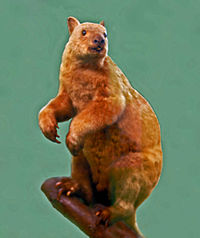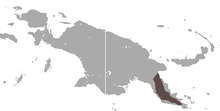Doria's Tree Kangaroo
| Doria's tree-kangaroo | |
|---|---|
 |
|
| Dendrolagus dorianus from New Guinea. Stuffed specimen | |
| Scientific classification | |
| Kingdom: | Animalia |
| Phylum: | Chordata |
| Class: | Mammalia |
| Order: | Diprotodontia |
| Family: | Macropodidae |
| Genus: | Dendrolagus |
| Species: | D. dorianus |
| Binomial name | |
|
Dendrolagus dorianus Ramsay, 1883 |
|
 |
|
| Doria's tree-kangaroo range | |
Doria's tree-kangaroo (Dendrolagus dorianus) is a tree-kangaroo endemic to Papua New Guinea.
This marsupial is found in montane forests of southeastern New Guinea island, at elevations between 600–3650m. The species was named in 1883 by Edward Pierson Ramsay in honour of Italian zoologist Giacomo Doria.
Doria's tree-kangaroo is one of the largest tree-kangaroo species, and weighs 6.5–14.5 kg, its length is 51–78 cm, with a long 44–66 cm tail. It has long dense brown fur with black ears and a pale brown or cream nonprehensile tail. It has large and powerful claws and a stocky build that gives it a bear-like appearance.
It is mostly solitary and nocturnal.
Its diet consists of various leaves, buds, flowers and fruits. The gestation period is about 30 days, after which, the single young remains in the mother's pouch for up to 10 months.
Doria's tree-kangaro is an IUCN Red List Vulnerable species. Its forest habitat is threatened by logging and forest clearance. Being large sized, it is also hunted for its meat.
...
Wikipedia

